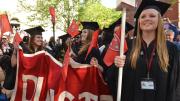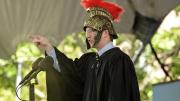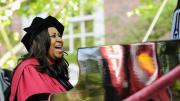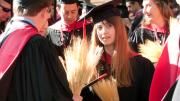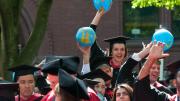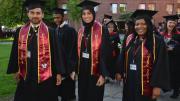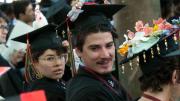Last year, the Commencement Morning Exercises went off humidly, in a pre-summer heat wave. This year, not so much, as the morning low, 44 degrees, nearly broke the record for the date. But the skies were beautiful, as clear blue as spring in New England can offer. Perhaps in keeping with the weather, the events proceeded unusually briskly, with few ad libs, and with student cheering primly contained.
During the exercises, the University conferred honorary degrees on five men and three women (background information on each is available here), including former United States president George H.W. Bush, novelist Isabel Allende, singer Aretha Franklin, Nobel laureate in economics Joseph E. Stiglitz, and the speaker for the afternoon program, Michael R. Bloomberg—entrepreneur, philanthropist, and former mayor of New York City. Students received 7,301 degrees and 33 certificates; undergraduates in Harvard College earned 1,662 of those degrees.
The program for the morning exercises is posted here.
After the exercises were called to order—five minutes late, at 9:50 (perhaps reflecting tight security screenings)—honorand Aretha Franklin, at the piano, led a soulful singing of the national anthem (and not, as indicated in the program, "My Country, ’Tis of Thee"). The chaplain of the day, Rabbi Jonah Steinberg, then offered the opening prayer.
Following the Commencement Choir's rendition of Domine salvum fac, by Charles Gounod, it was time for talk. The traditional student orations (now called “addresses,” perhaps to make them seem less forbidding and to encourage more applicants to compete to secure one of the parts) were delivered by Timothy Barry-Heffernan ’14 (the Latin salutatory and its English translation); Sarah Abushaar ’14 (the Senior English Address); and Philip Harding, M.P.P. ’14 (the Graduate English Address). The Harvard Gazette profiled the speakers here.
“De Septuagensima Secunda et Trecentensima Legione”
Barry-Heffernan, a mathematics concentrator who also studied computer science, is from nearby Hingham, Massachusetts. When he was not doing problem sets in Winthrop House, he also earned a Latin-language citation (and played percussion in the band, his gig during the three previous Commencements). Although he is headed for Hewlett-Packard’s Southborough, Massachusetts, facility, where he will be a software developer, Barry-Heffernan—who donned a Roman helmet for his oration, and did a fair job of channeling the Steve Martin of "King Tut" fame—may have other options if that job doesn’t work out. His talk, “On the 372nd Legion,” recounted the local rigors and triumphs, thus:
Proinde mihi permittatis principium expedire: scientiae inveniendae causa, fortes permulti ex sedibus dulcibus egressi sumus; caelum calidius et cibum notum et “Frangentes Fratres Magni” nimis lusum reliquimus, ut operam maximam argumentis discendis daremus. O, quam saepe Quietes Cerebrosas turbavimus, lacrimantes cum cruciati essemus pensis mathematicis! Quantum sterculini fudimus in progymnasmata Doctrinae Generalis! Quam vastum mare cafeae bibimus! At illa hora taeterrima cessit; atque si quis ambigat, ei iam rogo: nonne superavimus? Nonne nostri quam plurimas botones in clarissimo “Libro Vultorum” posuerunt? Nonne annales ingentes de Colombianis fabulis libidinosis scripsimus? Nonne inflationem mundi repperimus?
(“Indeed, let me harken back to our beginnings. We brave thousands set forth from our sweet homes in our pursuit of knowledge; we left behind warmer weather, familiar cooking, and hours of ‘Super Smash Brothers,’ in order to apply ourselves to the most onerous task of studying. Oh, how many brain-breaks did we fill, weeping at the torment of problem sets! How much BS did we pour forth into our Gen-Ed essays! What ocean of coffee did we drink! But those dark days are gone and, to any cynic, I now ask: are we not victorious? Have our cohorts not added countless buttons to the lofty Facebook? Have we not written tomes chronicling Colombian soap operas? Have we not uncovered the inflation of the cosmos?”)
Celebrating the basketball team’s first-round NCAA victory, he pantomimed a shot while declaiming:
Et denique, in campo ludi canistri, adversarios dignos inusitatosque pugnavimus; sed sicut Ajax et Diomedes et Achilles arserunt in bello, ita Rivardus et Caseus et Currius Cincinnatos illos straverunt! Mirabile visu!
(“And, at last, on the basketball court, we fought worthy foes, whom we had never encountered; but just as Ajax, Diomedes, and Achilles raged in battle, so too did Rivard, Casey, and Curry lay low those men of Cincinnati! What a sight to behold!”)
There isn’t software for this stuff—yet.
“The Harvard Spring”
Abushaar, an economics concentrator who was born in the United States and raised in Kuwait (where, at the age of seven, she met honorand George H.W. Bush, the Gazette reports), will graduate in December. A Leverett House resident, she has worked extensively in the financial industry, and expects to pursue a business career, with a stop at business school along the way. Her talk compared the constraints on life where she grew up with the freedoms of the Harvard community.
She recalled being shushed by her parents as a child, lest her prattle in Syria cause trouble: “‘You’ll get taken by secret service if they hear you.’ The walls everywhere, we were told, could hear our revolutionary ideas and would send us to prison.”
How different things are in Cambridge, she found:
Arab-American author Randa Jarrar pictures inhabiting a new place as “[…] running barefoot, the skin of our feet collecting sand and seeds and rocks and grass until we had shoes, shoes made of everything we’d picked up as we ran.” And running through Harvard Yard over the past four years, the skin of our feet collecting a world of experiences, we each become this place in a strange way, each of us picking up bits of people and history and ideas that changed the way we saw the world…accumulations I hope we will continue to wear on our “soles” and leave a footprint of all the best we took from Harvard Yard on our new destinations.
And that’s why I am hopeful for the future.
In place of an Arab Spring, she continued:
[T]his graduation is sending 6,000 revolutions into the world in the 6,000 revolutions graduating as part of the class of 2014… if we take those waiting revolutions, those great ideas…out with us into the real world, into the real Tahrir Squares, and make something of them! Revolutions not in arms but in minds… more powerful and permanent…and pervasive. For, this isn’t a Ukrainian revolution or an Arab Spring, but a global revolution.
This is the Harvard Spring of 2014. This is the Harvard Spring!
“A Kind of Destiny”
Harding, who operates at the intersection of business, technology, and governance, and is headed for work on government innovation in Washington, D.C., recalled George Washington coming to Harvard “uncertain of his future and his fate. He had received an offer he could not refuse: though he felt unworthy, he wrote to his family and said he felt ‘a kind of destiny’ was driving him to Cambridge. He spent his first night sleeping—here—in Harvard Yard and awoke the next morning—July 3, 1775—to take command of the troops of the United Provinces of North America—the fledgling Continental Army”—the ultimate startup, if you will.
That public entrepreneur, Harding continued, “took what was offered to him here at Harvard and he made the most of it—and I’m not just talking about the brass doorknobs or the metal roof he took off Harvard Hall to melt into musket balls. He took ideas that existed only as words and writings and turned them into reality for millions and generations to come.”
Harding then challenged his audience: “Whether you are driven to solve the world’s largest public or private problems, find a cure for that dreaded disease, alleviate human suffering, generate knowledge and push education forward, work across religious and cultural divides, create effective legal frameworks, construct the future world we live in, or use technology to enable new discoveries and innovations—Whatever ‘kind of destiny’ is compelling you today, imagine the countless lives that are waiting for you to step up.” The focus of that mission he made clear in a final plea: “[L]et us not just go change the world, but let us go serve the world with passion.”
The Conferring of Degrees
As elm seeds wafted down, Provost Alan Garber began the conferral of degrees. Faculty of Arts and Sciences dean Michael D. Smith, the first to present his candidates, introduced the one wrinkle in the day. As is the custom, each dean bows, removing her or his cap, recognizing "Madame President, Fellows of Harvard College. Mr. President, Members of the Board of Overseers." Then, nodding to President Bush, Smith added a third element, simply, "Mr. President." Successor deans followed suit, until the dean for medical education, Jules L. Dienstag, presenting the M.D.s, added (for Mayor Bloomberg and Aretha Franklin), "Mr. Mayor and Madame Queen [of Soul]."
A few deans had cap trouble—Huntington Lambert, of the Extension School, getting his on backward at one point, and the Law School’s Martha Minow reaching the microphone altogether capless—but no matter. The Graduate School of Education’s new dean, James Ryan, in his debut performance, delivered his part from memory, without referring to any crib notes in his cap (unlike at least one predecessor). The School of Public Health’s Julio Frenk alluded to his school’s centennial, and the exercises continued on efficiently.
When Garber turned to the undergraduate candidates, he began by saying, “With warm appreciation for his leadership and service this past year, I recognize the interim dean of Harvard College,” botanist Donald Pfister, whom the students cheered warmly. Pfister, a former House master and an expert on fungi (his last message to the College students, in the morning’s compendious Crimson, pointed out that inky-cap mushrooms, a species of the genus Coprinus, are growing in the Yard right now), won wide support through his regular, informal communications on matters small and great. Attempting to perform his act of presenting the College candidates for their degrees, Pfister choked up, paused, said, “I’m emotional,” was cheered some more, and then completed his formal responsibility to his charges. Rival House cheers broke out, and then it was time for more song, and the honorands.
The Honorary Degrees
Garber marched through the degrees in the following order. (Customarily, the Afternoon Exercises speaker is granted the last honorary degree, but protocol dictated that President Bush be recognized in that way.)
- Seymour Slive, the art historian, whom Garber called a “teacher of uncommon prowess and flair” whose work embodies the University’s commitment to understanding and preserving culture; Doctor of Arts, for a scholar whose “own career [is] a rare work of art.”
- Patricia King, multidisciplinary legal scholar and former Corporation member; Doctor of Laws, recognizing the work of “bridging disciplines and overcoming barriers” as “a trusted trustee.”
- Joseph E. Stiglitz, economist and Nobel laureate; Doctor of Laws, for scholarship “demarking the limits of markets, discerning global discontents” and proving to be a “paramount progenitor of information economics.”
- Peter H. Raven, plant biologist and conservationist; Doctor of Science, “he has nourished our knowledge of the phyla of flora.”
- Isabel Allende, novelist, whom Garber called a “testament to Chile’s tumultuous times” (in reference to the 1973 coup that ultimately drove her from her country); Doctor of Letters, “conjuring memories blown by winds of exile, leavening realism with dashes of magic.”
- Aretha Franklin, singer, whose voice her home state of Michigan has declared one of its natural resources; Doctor of Arts, “with sweet passion, almighty fire, and amazing grace,” she is “a natural woman.” As she held her degree aloft, the band struck up "Respect."
- Michael R. Bloomberg, entrepreneur, philanthropist, and former mayor of New York; Doctor of Laws, “From Hopkins to Harvard, Wall Street to City Hall,” this resolute leader and fervent philanthropist “helped our biggest burg to bloom.” As Bloomberg and Faust cracked up, the band piped up with “New York, New York.”
- George H. W. Bush, forty-first president of the United States, who gestured toward his wife, Barbara, in the audience, when Garber mentioned their marriage; Doctor of Laws, “With faith, courage, and service true, his eyes ever fixed on points of light, he piloted our nation through changeful skies.” Bowing to his college and subsequent experiences, “His cap was Blue, his house was White, and now his gown is Crimson.” The band quoted the “Bulldog” fight song.
With that, University marshal Jacqueline O’Neill laid out the closing sequence of events. All sang the Harvard Hymn. Pusey minister in the Memorial Church and Plummer professor of Christian morals Jonathan L. Walton offered the benediction, with a nod to Aretha Franklin’s father, the Reverend Clarence Franklin, calling out, “Stir us, oh God,” to be kind, to be of service, and to know ourselves better and love ourselves as we are, so that we might love our neighbors as ourselves. “Stir us, stir us, so that we might in humble ways bring Your kingdom on earth as it is in heaven.”
The Sheriff of Middlesex County then loudly adjourned matters, the bells rang out at 11:42, and lunch beckoned.
